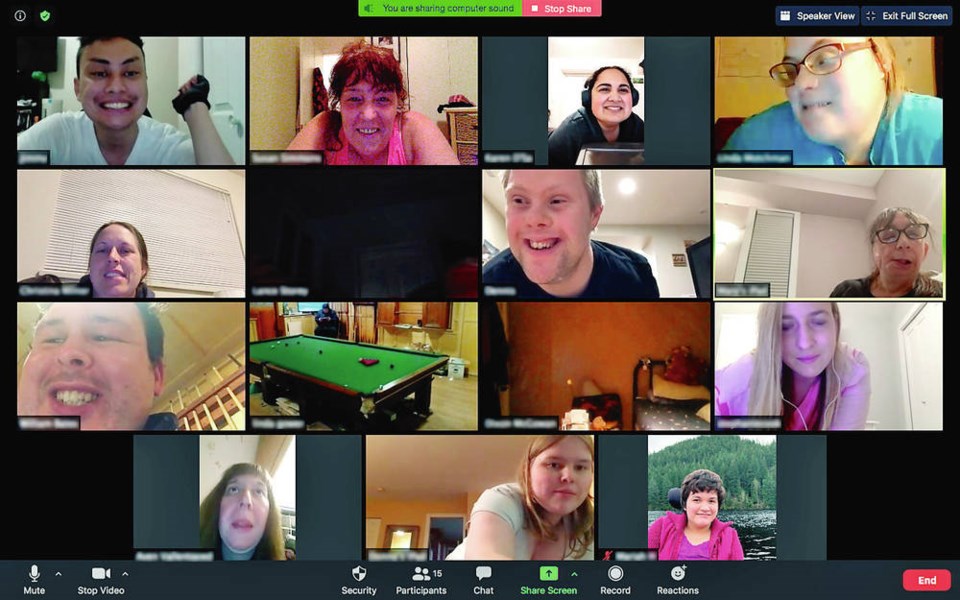Five nights a week, Susan Simmons’ James Bay apartment is filled with the sounds of almost 20 people laughing and chatting as she leads them in squats, cardio workouts and the occasional dance party.
She’s not hosting any illicit COVID gatherings, though. The Special Olympics coach is using Zoom to connect with Special Olympics athletes from across Vancouver Island and the Lower Mainland as a way to combat loneliness and isolation amid the pandemic.
Simmons, the swim coach for about 60 Special Olympics athletes, used to check in with her team face-to-face in the lobby of Crystal Pool before swim practice. When sports programs ground to a halt in mid-March as B.C. declared a state of emergency, Simmons knew she needed to do something to keep the group connected.
“It was something I felt they needed, to have a place to connect with each other socially and share any challenges they were having,” she said.
Two weeks after the pandemic was declared, with the help of fellow Victoria-based Special Olympics coach Kyle Eriksen, Simmons launched a Zoom Room for Special Olympics athletes where she leads fitness classes, ending the session with a mental-health check.
The 8 p.m. virtual hangouts now take place five nights a week — every Monday, the focus is upper body, while Tuesday is cardio night and Wednesday is squat night — with a monthly dance party, which sometimes morphs into a theme night such as Special Olympics quiz show or a nutrition session.
Lisa Newell is among the 20 athletes from Vancouver Island and the Lower Mainland who have been participating in the virtual sessions. Newell, who is legally blind, is a powerlifter who has won gold, silver and bronze medals in regional, provincial and national Special Olympics competitions.
The 39-year-old Victoria woman said while she misses seeing her friends in person, the Zoom Room has been a bright spot in her day.
“I met people I never knew before from all over the Island,” said Newell, who spoke while on a break from her job at the Beacon Community Services thrift store on Pandora Avenue. She was particularly proud when she and other athletes completed 500 squats in one night, a goal everyone worked up to over weeks, as Simmons upped the number of squats each night.
“I’d like to keep the Zoom Room forever,” she said.
There are about 900 Special Olympics B.C. athletes on Vancouver Island and 600 volunteers. Special Olympics athletes have intellectual disabilities such as Down syndrome or are on the autism spectrum, and some also have physical challenges such as cerebral palsy. While most Special Olympics B.C. programs have been cancelled due to health restrictions, some small in-person adult sport training and youth programs are still running.
Simmons said the check-ins have been even more important than the fitness sessions. The online community was there when two athletes lost loved ones, one to COVID-19 and one to cancer. Recently, an athlete who was sick shared that she was overcome with fear that she had contracted the COVID-19 virus.
“She was in bed under her blankets in tears. She said ‘pray for me,’ ” Simmons recalls. Some of the athletes checked in regularly with the woman, who ended up testing negative for the virus.
“We have this virtual community, but it’s gone beyond that,” Simmons said. “This is a group of people holding one another together.”
Simmons said the Zoom chats have also helped her mental health.
“It’s the light at the end of my day,” she said. “The folks in Special Olympics are the light in the world. They bring the joy, the innocence, the purity that we all need. They bring love with them everywhere they go.”
With all the uncertainty around when the athletes will start training again, Simmons said it’s important to focus on the present instead of the future.
“If you’re always looking to the future, you’re never going to enjoy what you have right now,” she said.
And right now, these Special Olympics athletes have each other.
Note to readers: This story has been corrected. A previous version was not clear that all Special Olympics athletes have intellectual disabilities, and suggested a relationship between the timing of the Olympics and the Special Olympics; they are independent.



